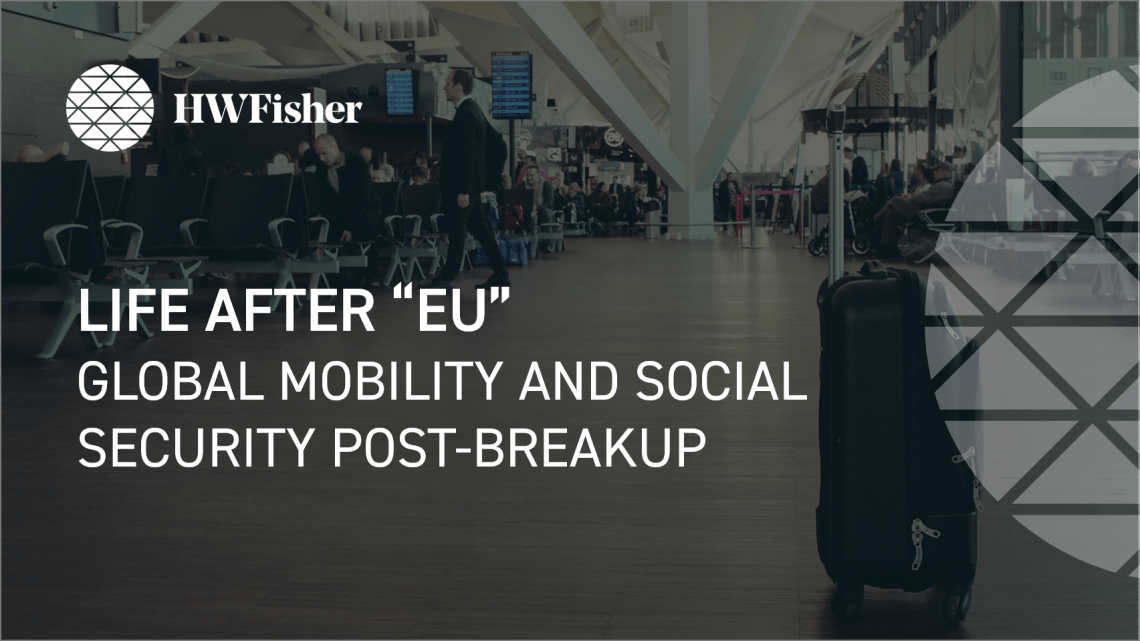
In addition to the wrangling and ongoing negotiations as part of one of the biggest breakups in history, navigating the new rules as part of the social security system can be difficult post-Brexit.
Determining where social security contributions should be paid, and by whom, should therefore be a fundamental part of the planning process for all internationally mobile employees and their employers.
Should an internationally mobile employee pay contributions in the country in which they are assigned or continue to pay contributions into their home system despite living and residing elsewhere?
Generally, employees will pay social security contributions in the country where their work is carried out or where their duties are performed. However, there are exceptions to this rule which can differ from country to country depending on the nature of the assignment.
If an employee is assigned to another country for a temporary period, the two countries may mutually agree that social security contributions are only payable in the “home” country and that no contributions are payable in the country in which the work is actually carried out.
To determine the social security position for internationally mobile workers, the world has traditionally been split into the following three areas;
If an employee is assigned to work in a non-reciprocal country, the default position is that UK social security contributions will cease and the employee will become subject to the social security regime of the host country.
In such a scenario, the employee may wish to elect to pay voluntary contributions in the UK to preserve their entitlement to UK benefits.
However, if the employer has a place of business in the UK, then UK social security contributions should continue to be paid for the first 52 weeks of the overseas assignment. This may result in dual contributions in both the UK and the country in which the employee works.
The UK contributions will generally cease after 52 weeks, However the employee may wish to consider making voluntary contributions to maximise their entitlement to UK state pension.
Conversely, where a worker is coming to the UK from a non-reciprocal country, their earnings will typically be liable to UK social security contributions.
Although, again there is a 52-week exemption which can eliminate the UK contributions for the first 52 weeks. .
If an employee is assigned to work in a reciprocal country, liability is determined by reference to the specific bilateral agreement between those countries.
For example, the UK/USA social security agreement allows an employee assigned from the UK to the USA to remain within the UK system (and not pay US social security contributions) where the posting is for five years or less.
Prior to 1 January 2021, the UK was covered by UK/EU Social Security Regulations.
These regulations stated that where an employee intended to spend a short period of time (24 months or less) working outside their EU home country and the home country employment contract remained in place, then that employee could elect to remain within their home country’s social security system.
For longer postings it was possible to remain in the home country scheme if the relevant authorities agreed.
Brexit had the potential to change all of this….
Thankfully, a deal has been agreed and The “UK-EU Trade and Co-operation Agreement” became effective from 1 January 2021.
The agreement contains a protocol on social security co-ordination between the UK and the EU, under which the rules operate broadly as they did before Brexit.
Therefore an employee who is sent on a temporary (24 months or less) posting to another EU state will continue to be subject to the social security legislation of their home country.
Once the 24-month period has expired, contributions will be payable under the system of the country where the work is carried out.
The post-Brexit rules do not cover Norway, Iceland, Liechtenstein and Switzerland. A summary of the rules
Navigating life after any breakup comes with challenges – to keep updated on the latest post-Brexit rules, please get in touch with one of our specialists.
We’d love to hear from you. To book an appointment or to find out more about our services: